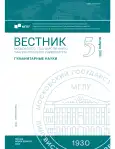Lexical and Semantic Representation of the Concept «Misserfolg» (on the material of German journalism)
- Authors: Severina E.A.1, Skvortsova N.S.1
-
Affiliations:
- Moscow State Linguistic University
- Issue: No 5(886) (2024)
- Pages: 108-115
- Section: Linguistics
- URL: https://journal-vniispk.ru/2542-2197/article/view/303555
- ID: 303555
Cite item
Abstract
The article deals with the content elements of the concept ‘Misserfolg’ in modern German. The concept ‘Misserfolg’ is a multi-level mental entity that has a number of distinctive features described in the article and analyzed in detail on empirical material, which is based on the data of dictionaries and texts of modern German publicistic discourse. The analysis revealed the difference in the conceptual content at the level of the core and the periphery of the concept.
About the authors
Ekaterina Andreyevna Severina
Moscow State Linguistic University
Author for correspondence.
Email: ratriniada@mail.ru
PhD (Philology), Senior Lecturer of the Department of Lexicology and Stylistics of the German Language Language
Russian FederationNatalia Sergeyevna Skvortsova
Moscow State Linguistic University
Email: nskvortsova18@gmail.com
PhD (Philology), Associate Professor of the Department of Linguistics and Political Communications
Russian FederationReferences
- Boldyrev, N. N. (2001a). Kognitivnaja semantika: Kurs lekcij po anglijskoj filologii = Cognitive semantics: A course of lectures on English philology. 2nd ed. Tambov: Izdatel’stvo Tambovskogo universiteta. (In Russ.)
- Karasik, V. I., Slyshkin, G. G. (2005). Bazovye harakteristiki lingvokul’turnyh konceptov = Basic characteristics of linguistic and cultural concepts. Anthology of concepts (pp. 13–15). Volgograd: Paradigma. (In Russ.)
- Boldyrev, N. N. (2001б). Koncept i znachenie slova = Concept and meaning of the word. In Metodologicheskie problemy kognitivnoj lingvistiki (pp. 25–36): collection of papers. Voronezh: Voronezh State University. (In Russ.)
- Hrynina, E. N. (2009). Lingvokul’turnaja specifika koncepta «Uspeh/Erfolg» = Linguistic and cultural specificity of the concept “Success / Erfolg”: abstract of PhD in Philology. Stavropol’. (In Russ.)
- Kazakova, N. Ju. (2011). Obshhechelovecheskaja cennost’ «uspeh» v jazykovom soznanii russkih i nemcev na sovremennom jetape = “Success” as the universal value in the linguistic consciousness of the Russians and the Germans of today. In Lingvistika i metodika prepodavanija inostrannyh jazykov: periodical collection of articles, 3, 89–106. https://iling-ran.ru/library/sborniki/for_lang/2011_03/4.pdf. (In Russ.)
- Hlopova, A. I., Ladosha, O. M. (2021). Leksiko semanticheskoe soderzhanie cennosti «Erfolg» v nemeckoj lingvokul’ture = Lexical and semantic content of the “Erfolg” value in German linguistic culture. Theoretical and Applied Linguistics, 7(2), 135–151. 10.22250/2410 7190_2021_7_2_135_151. (In Russ.)
- Homkova, L. R. (2002). Strukturno-semanticheskaja harakteristika metaforicheskogo frejma «rabota – uspeh – neudacha» (na materiale nemeckogo jazyka) = Structural and semantic characteristics of the metaphorical frame “work – success – failure” (based on the material of the German language): PhD in Philology. Irkutsk. (In Russ.)
- Jackendoff, R. (1993). Semantics and cognition. Cambridge, Mass. [u.a.]: MIT Pr. 6 print.
- Ungerer, F., Schmid, H. (2006). An introduction to cognitive linguistics. 2nd ed. L.: Longman.
- Kubrjakova, E. S. (1996) Koncept = Concept. In Kubryakova, E. S. (ed.), Kratki slovar’ kognitivnych terminov (pp. 90–93). Moscow State University Publishers. (In Russ.)
- Sternin, I. A. (2001) Metodika issledovanija struktury koncepta = Methodology for studying the structure of a concept. In Metodologicheskie problemy kognitivnoj lingvistiki (pp. 58–65): collection of papers. Voronezh: Voronezhskij gosudarstvennyj universitet. (In Russ.)
- Vorkachev, S. G. (2002). Koncept schast’ja v russkom jazykovom soznanii: opyt lingvokul’turologicheskogo analiza = The concept of happiness in the Russian linguistic consciousness: experience linguocultural analysis. Krasnodar: Kuban State Technological University. (In Russ.)
Supplementary files










